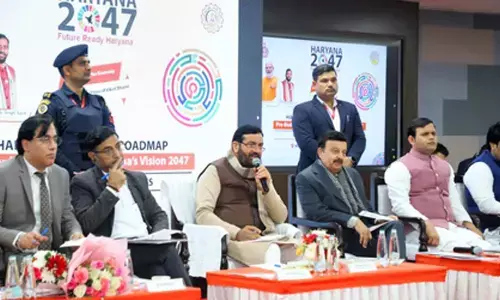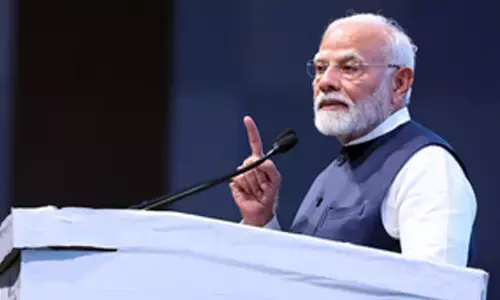Comprehensive food supplements, a powerful tool

Comprehensive food supplements, a powerful tool
CCMB developed two different products with Cordyceps militaris. One is the food supplement CoronAid that was launched in October 2020 and the other is in the form of drug or anti-viral.
CCMB developed two different products with Cordyceps militaris. One is the food supplement CoronAid that was launched in October 2020 and the other is in the form of drug or anti-viral. Since researchers at CCMB and the company Clone Deals have proved the efficacy in a laboratory, they received the permission from regulatory authorities to launch the product as a food supplement. CCMB is providing support to researchers and startups who are working in the field of the Covid -19 Pandemic. Food Safety and Standards Authority of India (FSSAI) has given approval to CoronAid. The CoronAid, is also available in the form of liquid.
The food-supplement, CoronAid is made out of mushroom Cordyceps militaris, which grows in Himalayan region and is known for its anti-viral, anti-aging, anti-tumour, anti-oxidant, anti-inflammatory properties. The mushroom powder preparation is also mixed with curcumin, which is another active ingredient to prepare CoronAid Anti-Viral Immunity Booster Oral Suspension food supplement.
Cordyceps militaris consists of an active ingredient Cordycepin, which is known to prevent formation of new DNA and RNA strands. Clone Deals has collaborated with researchers from CCMB and have established the potency of cordycepin in stopping the growth of SARS-CoV-2 in cell-culture system i.e. in a laboratory.
In a joint effort, CSIR-Centre for Cellular and Molecular Biology (CCMB), ICMR-National Institute of Nutrition (NIN) and Bharat Biotech have estimated the seroprevalence of antibodies against the coronavirus SARS-CoV-2 in Hyderabad city.
This study of around 9,000 samples, finds that around 54 per cent of Hyderabadis show antibodies against SARS-CoV-2, indicating prior exposure to the coronavirus. The study brings a comprehensive perspective of potentially protective immune response against the coronavirus in the city's population. The data indicates that the population of Hyderabad might be slowly moving towards herd immunity, which will be certainly accelerated by the ongoing vaccination effort.
Methodology
Scientists checked for antibodies against the virus in people across 30 wards of the city. Over 300 individuals, from each ward, all of them older than 10 years, were tested. Most of the wards showed a similarly uniform range of seroprevalence, of 50-60 per cent. However, a few wards showed as much as 70 per cent or as low as 30 per cent as well. Women showed a marginally higher seropositivity rate (56 per cent) than men (53 per cent). Those above 70 years of age showed a lower seropositivity (49 per cent), perhaps because of limited mobility and extra care taken by older individuals during the pandemic.
Unsurprisingly, those who had Covid-19 positive cases in their own households, showed the maximum seropositivity of 78 per cent. This was followed by those with known Covid-19 contacts outside their household (68 per cent). Scientists at NIN observed that those in houses with a larger number of rooms and small family size households had low prevalence of coronavirus infection.
This study also showed that more than 75 per cent of the seropositive population did not know that they had contracted coronavirus infection. This suggests seroconversion, which is antibody formation has happened even with silent infections. According to the study, individuals who had suffered the prominent Covid-19 symptoms as well as those who were asymptomatic had equivalent seroprevalence of around 54 per cent. About 18 per cent of the study group had been tested earlier and found positive for the coronavirus while 90 per cent was found to be seropositive, suggesting that they retain the antibody response.
CSIR-Centre for Cellular and Molecular Biology (CCMB), Hyderabad and CSIR-Institute of Microbial Technology (IMTech), Chandigarh has released their data on the air-borne nature of coronavirus, SARS-CoV-2. Scientists have worked with six hospitals, three in Hyderabad and three in Chandigarh to find if the virus particles can be found in air samples in the hospital wards. They used an air sampler that can collect the virus particles, and then looked for their presence using RT-PCR.
In this study, the virus was found in air samples from Covid-19 wards from hospitals but not from non-Covid-19 wards. This suggests that the demarcation of hospital zones has been an effective strategy. The study also showed the chances of picking up SARS-CoV-2 in the air is directly related to a number of Covid-19 positive cases in the room, their symptomatic status and the duration of exposure.
When Covid-19 individuals spent long hours in a room, the virus is found in the air for more than two hours even farther than 2 metres from their seating places. But for asymptomatic cases, they showed the virus does not spread farther from them when they are seated in a room without perceived airflow due to a fan or AC.
If we ensure that we follow hygiene protocols such as regular handwashing, using masks effectively and preventing symptomatic people from public mixing, we can start getting back to normalcy more comfortably. Detecting and isolating the positive cases early on can help prevent the spread among other family members in a home setting too. There is an immediate need for the governments to control all the activities involving clustering of people into groups to control the current "dangerous" trend in the rising number of Covid-19 cases in the country and across many States, assert top scientists involved in combating the SARS-CoV-2 virus.
Congregations and group activities to be curtailed include political meetings, rallies, road shows, markets, religious gatherings, cinema halls, restaurants, bars, pubs and any indoor events. "People meeting in groups in any of these activities are a recipe for disaster. We have to minimise crowding because lockdowns affect the economy and livelihoods, so we have to ensure non-essential things are stopped. If we have to keep a control on the virus, we have to wear masks all the time when we step outside the house even for walking the dog, or it is like being naked. It may also be prudent to change clothes after an outdoor visit to be doubly cautious.
(The authors are State president, Praja Science Vedika, Hyderabad and Professor, SNIST, Hyderabad respectively)
Dr M Suresh Babu and Dr D Asha Devi










